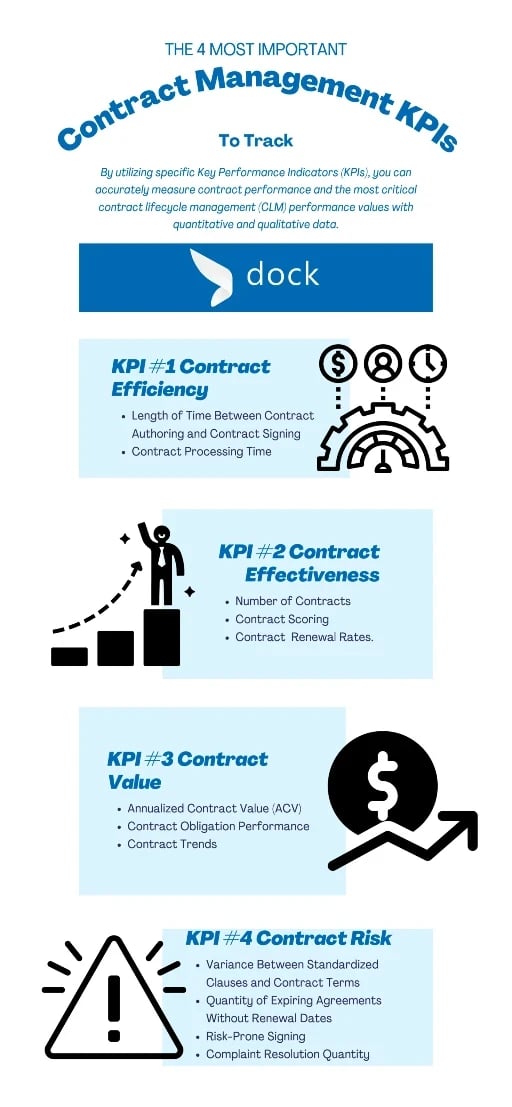
The 4 Most Important Contract Management KPIs to Track
Contracts play a vital role within every company, and they are woven throughout various aspects of every business. The key is that contracts define set rights and policies for vendors, clients, employees, and for the company itself. However, how can you ensure that contracts are executed properly and that there's follow-through on all of their contained terms?
By utilizing specific Key Performance Indicators (KPIs), you can accurately measure contract performance and the most critical contract lifecycle management (CLM) performance values with quantitative and qualitative data. By measuring several key performance indicators, you can keep the most important contract data within mind to help you manage your contracts better and optimize your contract lifecycle management system moving forward.
An Introduction to Contract Lifecycle Management Key Performance Indicators (KPIs)
Key performance indicators are pieces of quantitative and/or qualitative data that measure the performance of a given contract. These measurements are central to understanding the effectiveness of your company’s efforts towards specific business goals. Monitoring KPIs helps you know where to continue using your current processes if they generate desired results. To add, KPIs can also help you oversee the performance of your company as a whole, of your teams and departments, or of individual employees. In the context of this blog, KPIs can be used to measure the performance and success of your company’s contracts.
We suggest focusing on both strong and soft KPIs for contract management success. For example, a strong KPI will assess the main needs of your business and can be measured quantitatively. On the other hand, a soft KPI will measure more qualitative data, such as customer experience. Take these KPI types under consideration for a holistic view of your contract lifecycle management (CLM) system. Over time, it may be advantageous to evolve and change which metrics you measure.

The Most Important Contract Management KPIs to Track
To optimize your contract lifecycle management, your company's legal department should determine specific contract management practices and develop trackable measures to monitor so that you can optimize your system. Because every contract is unique in some capacity, it can be difficult to select which contract management KPIs to monitor on a consistent basis. Below, we will discuss the most important contract management KPIs to track that we suggest for the majority of companies today. In this way you can get ahead in optimizing the performance of your contracts and of your contract lifecycle management as a whole.

There are 4 KPIs below, each with subcategories so that you can develop a comprehensive understanding of how to track your contract performance.
KPI #1 – Contract Efficiency
A single contract lifecycle seems like an exhaustive process involving several people to complete several different jobs on a single legal agreement. With delays, bottlenecks, and miscommunications, contract management can become even more demanding and can feel like an endless process. However, by analyzing the trends in your contracts, you can optimize and speed up contract lifecycles so that you can close deals quickly, increase results, and boost business revenue. Let's take a look at some contract efficiency KPI's.
The timespan that takes to complete an entire contract lifecycle management metrics differs based on the contracting types, scope, demands from both parties, negotiation phases, contract designing, and execution. The sooner you can close a contract deal, the quicker the revenue returns. For that, a satisfactory time range from contract initiation to sign-off phase needs to be decided prior by the stakeholders.
In such situations, an automated contract management solution can be used to keep track of the live contracting process to decide and rectify the areas of improvement based on time and profits. Moreover, the CLM system can effortlessly reduce the duration for accomplishing the objectives of contract management by using e-signatures, automated drafting, and clear monitoring to produce immediate results. CIL is therefore considered as one of the most important contract management KPIs used to measure your contract management ROI.
-
Contract Processing Time
The amount of revising a document requires, the quantity of file downloads and uploads, and the overall time it takes to collaborate on your legal agreements plays a role in how fast your business can collect revenue. The worst thing you could do is waste time processing your contracts more than what the contract ends up being valued at.
We recommend organizing your contracts by financial value, contract type, and other identifiers. When you examine trends by these different characteristics, you can pinpoint where delays occur within contract lifecycles so then you can fix the issue within the workflow.
.webp?width=700&name=image-png-Sep-15-2021-08-39-10-67-PM%20(1).webp)
A contract lifecycle management (CLM) software solution can help you track KPIs and oversee contract metrics and insights on a dashboard. You can also generate accurate reports according to various contract data points based on contract insight provided by your dashboard.
KPI #2 – Contract Effectiveness
Be proactive so you can properly manage obligations and meet deadlines and milestones. Some crucial KPIs to track when considering contract effectiveness include the following:
-
Number of Contracts
By tracking the quantity of contracts by client, vendor, location, or other characteristic, you can gain insights into how certain contract types perform against other contracts with the same characteristics. In this manner, you can easily identify how metrics are improving or declining, such as profitability and ROI.
-
Contract Scoring
You have to take a holistic view of your contracts to properly evaluate how they could perform better. A simple method to evaluate the effectiveness of your contracts is by notating qualitative measures and evaluating the various attributes of your contracts from these data points you can score your contracts and compare them to others.
-
Consistent Quality
Quality check is another important contract management KPI that needs to be measured. Maintaining a consistent quality on time, adds value to the contracting relationship. If a particular stakeholder fails to meet the desired quality in objectives of contract management, then there will be a crack in the overall contract process and dealings for the short-term. However, if one phase of the whole contract process is affected, gradually it will affect the long-term objectives of the entire contract process too. Therefore, promptly keeping up with the quality check of the contracting process is a vital factor for analyzing the contract performance measure.
-
Contract Renewal Rates
Oversee contract quality and the value of your business by assessing contract renewal rates. More renewals oftentimes mean higher client and vendor satisfaction. If you aren't consistently maintaining a substantial amount of contract renewals, it's most likely an area to improve upon in your contract lifecycle management system.
KPI #3 – Contract Value
The value of your contracts is one of the largest determining factors of your business's financial growth. When monitoring your contract value KPIs, it's necessary to understand the ways that your contracts are influencing your investments and your bottom line. Let's take a look at some important contract value KPIs.
-
Annualized Contract Value (ACV)
Your annualized contract value KPI measures the overall value of your recurring contracts. Tracking this datapoint is particularly helpful if your business works with a high volume of long-term agreements that are configured for autorenewal. With this KPI, you can also effectively compare the revenues of your new contracts and your recurring contracts. In addition, you can evaluate the amount of revenue lost by contracts that do not renew.
-
Contract Obligation Performance
Track the performance of your contractual obligations so you can stay proactive and avoid missing key milestones and deadlines. Missing these key items will result in unwanted fines, penalties, or accidental duplicate payments.
-
Contract Trends
Review historical contract trends so that you can create a well-informed strategy moving forward for your contracts. Identify what worked in the past and repeat it – or conversely, identify what didn't work previously in your methods and adjust.
KPI #4 – Contract Risk
Measure these specific contract risk KPIs to mitigate contractual risk and increase organizational compliance. Let’s take a look at some contract risk KPIs:
-
Variance Between Standardized Clauses and Contract Terms
Contracts that include unauthorized edits and contracts that not fully executed can seriously increase risk potential within your business. If your contracts deviate from standard clauses and terms, you decrease efficiency and prolong the lifecycle of your contracts. Within your contract lifecycle management software, you can oversee compliance and receive alerts when contracts vary between clauses and terms so that you can ensure compliance and manage risk.
-
Quantity of Expiring Agreements Without Renewal Dates
Contract lifecycle management software offers the ability to configure automated reminders and alerts of contract renewal and expiration dates. In this way, you will never miss a critical date again. By missing a contract renewal date, you can experience significant financial detriments. By enabling reminders of your renewal dates, you won't have to worry about missing out an important contract opportunity.
-
Risk-Prone Signing
Your organization has likely instituted various contracts management-related policies to protect and secure your business and its processes. With electronic signature integrations and contract approval workflows, you can increase the visibility and transparency of your processes while confirming that every step is compliant.
-
Complaint Resolution Quantity
Every business will receive complaints at some point, no matter the product sold, service being issued, or industry that the business is a part of. We recommend monitoring the number of complaints received and tracking how many were successfully resolved. Examine how complaints were resolved and use the same method in future, similar encounters.
Conclusion
We hope you learned some valuable information that you can take with you to optimize your contract lifecycle management processes. Use these various KPIs so that you can improve your contract lifecycle management system today. Dock offers an affordable and user-friendly approach to contract management that leverages your existing Microsoft 365 infrastructure. If you're in the market for a dedicated contract lifecycle management software solution, reach out and we would love to assist you with a complimentary demo of our solution.
Book a Live demo
Schedule a live demo of Dock 365's Contract Management Software instantly.

Written by Lindsey Paulk
Lindsey Paulk is a Content Writer in Jacksonville, Florida that specializes in digitally communicating all-things contract management.



